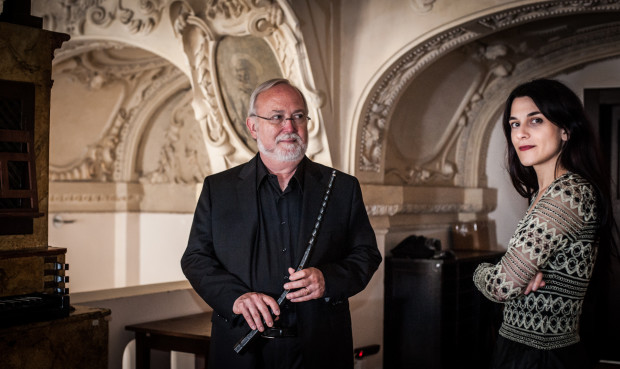Soprano and cornetto make for an illuminating afternoon

Cornettist Bruce Dickey and soprano Hana Blažíková performed Sunday at Corpus Christi Church.
The history of instruments is the history of classical music. Think of how the clarinet went from balky and unreliable to a staple of the orchestra, and how the creation and perfection of the modern piano not only spawned a huge repertory but was integral to the ubiquitous adoption of equal-tempered tuning.
Music Before 1800 is in one sense, an ideal instrument museum. Their period performances are a window into the instruments that drove the sound of early music, and Sunday afternoon’s concert at Corpus Christi Church was uniquely fascinating in this regard. The program, titled “Breathtaking,” featured the pairing of the soprano voice with the truly old and exceedingly rare cornetto.
The cornetto, commonly used in Medieval and early Renaissance music, is a wind instrument that combines the body and fingering of a recorder, with a trumpet-like mouthpiece. Sound and pitch are produced by vibrating the lips. In its day, it was thought to closely resemble the human voice, and the subtitle and subtext of the concert was the interplay between the two.
But as heard Sunday, soprano Hana Blažíková and cornettist Bruce Dickey occupied individual, though deeply sympathetic, sound worlds.
With one exception, the eleven pieces were by Italian composers of the mid- to late-17th century. They included sonatas for violin duo (Monica Huggett and Tekla Cunningham), violin and cornetto, and cornetto, violin, and viola da gamba (Joanna Blendulf).
Blažíková’s voice was prominent throughout, with Dickey’s cornetto accompanying and responding to her as an obbligato instrument. The soprano was exquisite, her first entrance in each new piece somehow more refreshing and sensational than all previous ones. Her voice has a unique beauty, a pure, colorful tone, with a mezzo-like dark energy. Her unadorned, but elegant and shapely phrasing connected notes and words in a wonderful musical whole.
Dickey’s playing was equally eloquent. His cornetto sound combined a trumpet’s attack with a sustained timbre close to an early double-reed instrument. His cornetto had an attractive, uncanny quality, as if the sound and articulation of the instrument were coming straight out of his throat.
Dickey was most prominent in Giovanni Battista Bassani’s Sonata prima a 3, Op. 5, playing the lead duet with Huggett, both accompanied by Blendulf’s responsive obbligato playing and theharpsichordist Michael Sponseller.
The music was lively with an unusual number of shifting moods. Dickey and Blendulf made up two-thirds of the trio with Blažíková for the one contemporary work, Calliope Tsoupaki’s Mélana imi, a 2015 setting of “Nigra sum” from the Song of Songs. Written for Blažíková and Dickey, the diatonic, minor key piece was technically not far from its forbears, save for some extended, suspended dissonant intervals, but the understated expression was very contemporary in its desolation.
Another high point was two love songs, Dilectus meus and Langue al vostro languir, from the great and mysterious Sigismondo D’India. The first was erotic and the second anguished, and the simplicity of Blažíková’s singing deepened the music’s expression of both.
The most vocalized instrumental sounds came from the two violinists in Biagio Marini’s Sonata seconda a doi violini. Their careful and expressive portamento, especially on descending lines, was closer to the way voices makes music than any other instrumental aspect on the concert.
The antepenultimate and final works were opera excerpts; a Sinfonia and three arias from La Morta Delusa, by Bassani, and three arias from Alessandro Scarlatti’s Emireno. In each, Blažíková and Dickey were accompanied by the full ensemble, which included Stephen Stubbs playing theorbo. These were spectacular combinations of gorgeous vocal writing, equally gorgeous singing, and vivacious playing. On the first word of each opening line, be it “speranza,” “senti,” or “labbra,” Blažíková shaped the phrase with a gradual, scintillating opening up of her sound until she reached just a touch of vibrato. Dickey responded with puckish wit, and one wondered how it happened that the cornetto fell out of fashion with the public.
Blue Heron performs Christmas and the New Year music from 15th-Century France and Burgundy at Corpus Christi Church, 4 p.m. December 18. mb1800.org





